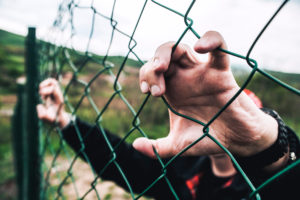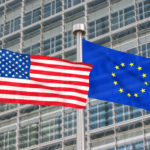OPINION: Countries such as Belarus and Turkey can “weaponise” migrants only because the EU acts in a frightened manner.
By Jacqueline Schwellensattel*
The European Union sees itself as a union of values in the international arena. It seeks to uphold human dignity, the rule of law and human rights. However, often these ideals seem to stand in conflict with the EU’s “security considerations”. In that respect, immigration is seen as problematic, and the European Union relies on deterrence and rejection. It stigmatises organisations such as Sea Watch for rescuing migrants at sea and pointing to the EU’s deficiencies and works with third countries. By externalising the EU’s borders, Turkey, for example, has become a key actor to “keep the problem out” while simultaneously, the EU can present itself as helping “third countries”.
How migration became a securitized topic in the EU
This manner of dealing with migration stems from a time when the Schengen Agreement first was established. Before that, examples like the guest worker agreements in the 1950s and 60s show that migration was perceived in positive ways, too – including the stimulation of economic growth. In the 1990s, however, the question of external borders and their control was elevated while at the same time internal borders were removed and the securitisation of migration was introduced.
Securitisation means that an issue – in this case migration from outside of the EU – is presented as an existential threat for the stability of the EU. In doing so, the use of exceptional political measures, such externalising problems and working with highly problematic third countries – is presented as both justified and necessary and needs to be accepted as such by European citizens. Securitisation has happened through a rhetoric of “an urgent need for action”. Due to the framing of (irregular) migration as a security issue, the EU has felt the need to take follow-up steps and extended externalisation processes. Security and migration are therefore seen as inevitably linked with each other and immigrants, refugees and asylum-seekers are viewed as a problem for the stability by the EU. This extensive process is inherently complex to disentangle and “desecuritise”.
Migration diplomacy and the case of Turkey
One result is the cooperation with third states like Turkey. Relations between the European Union and Turkey have always been complicated and full of disagreements and resentment. Nowhere has it become more obvious than in the handling of migration. Especially the so-called ‘refugee crisis’ of 2015/16 sparked a noteworthy momentum between the two actors.
In its partnership with Turkey, the EU has an interest to keep the perceived security threat out. As an “opportunistic state”, Turkey exploited this and changed its strategy towards the EU from 2015 onwards. The internal heterogeneity of the EU led to even more vulnerability and left the Union with strong incentives to give in to Turkey’s demands. The EU-Turkey Deal was born and with the European externalisation process, the gatekeeper Turkey was able to exploit its leverage.
"In European #migration policy, we have a situation where people are not working together, but just pointing fingers at each other. We should focus a bit more on solidarity and on solutions" – @ErikMarquardt MEP at the EU Watch policy conference pic.twitter.com/VMqI3PAzEK
— EU Watch (@EUWatchBrussels) November 5, 2021
This relationship lead to different characterisations of Turkey and narratives told about Turkish President Recep Tayyip Erdoğan. An ambivalent view on Turkey emerged: The country was seen as both a threat and the solution to a threat.
On the one hand, Turkey is perceived to have more power through the refugees it shelters. In this understanding, the migrants are seen as the threat, but they are utilized by Erdoğan as a tool to get his will and to be able to resist the EU’s demands and distance himself from the EU and its values with increasing authoritarianism.
Turkey, and specifically Erdoğan, have been perceived as dangerous and as being in a position to bully and blackmail the EU – moving from an actor that not so long ago was looked down on to a challenger of sorts.
On the other hand Turkey has also been considered as being a tool in stemming the “crisis”. Questions about accession, democracy, positive or negative characterizations get pushed in the background, and Ankara was viewed in a positive way, namely a strategic partner that assumes responsibility. In the end, the framing of migration has led to shifting power dynamics between the EU and third countries.
The case of Belarus
Looking at what is currently happening at the European border to Belarus, history seems to repeat itself. The accusation of using migrants as “pawns” or political tools to “blackmail” Europe was not only uttered in the case of Turkey. It is being repeated right now in the case of Belarus. And again, while blaming Lukashenko and his regime for the inhumane treatment of refugees, the EU does not want to be held accountable for it.
Dutch journalist Ingeborg Beugel attacked Greek PM Kyriakos Mitsotakis: “When, at last, will you stop lying about #pushbacks, about what’s happening with the refugees in #Greece?"
Mitsotakis: "I will not accept that you insult me, or the Greek people." https://t.co/ecQfIayMbp
— EU Watch (@EUWatchBrussels) November 10, 2021
Pushbacks, appeals for Belarus to stop putting people’s lives at risk and internal debates have been Europe’s response to the crisis at the border so far. The “weaponisation” of refugees by third countries continues, this time in Belarus, seems to be only possible because the EU acts in this frightened manner.
Values and security
So, what does this show? If something is perceived as a security matter, it should be dealt with as such. Seemingly, the best way to handle the “security issue” migration is protection and prevention of the “threat”. Except for a small number of voices that are positive about refugees coming to Europe, the issue has been perceived as a problem and been and discussed in that way.

Photo: Shutterstock
Yet, what if migration was not framed as such? Language and framings hold an immense power. The world, actions within it and relationships are shaped through language and narratives. It does not matter if refugees and migrants are a real threat. What is important is that they are seen as one by the EU and by a large number of European citizens.
This is where change needs to occur if the European Union really wants to respect its own values. The EU sees itself in a dilemma between security and values. However, security v. values should not be the topic of discussion. By seeing migration as a securitised issue, there is only one question one can ask: Can the EU stand up to its proclaimed values, or will it follow a tradition of xenophobia, racism and exclusion that it claims to have overcome?
The examples of Turkey and Belarus show not only how the EU shies away from its responsibilities. They also prove that the fear and the securitisation of migration weakens the position of the EU in relation to other actors. Instead of being outraged by the actors that make use of migration diplomacy – a tool only possible to use because of the EU’s ‘security concerns’ – the real necessity is to question how this securitisation can be dissolved.
Changing the view
The EU faces a demographic crisis with an overall aging population where migration can be used to counteract. The topic of migration can be looked at through a different lens: being one of social policies, opportunities, integrational questions and, in the case of asylum, as an uncontested right everyone has.
The case of Turkey is exemplary for a trapped EU, but the same is also becoming more and more visible in relation to Belarus. With a continuation of a narrative that speaks in negative and frightened ways about migration, no change will occur. Xenophobia and racism, the leverages of third countries and the suffering in refugee camps and the European borders will continue and only get worse.
Migration of any sort should be approached in a different way to overcome the evaluation between the economic and demographic advantages or disadvantages, its humanitarian values and security concerns. The EU’s politics of rejection and the inhumane detention of people in refugee camps does not only stand in contrast with its proclaimed values. It also weakens the EU itself and limits the political space that it can act within.
Drawing on this idea, and assuming that the perceptions and constructions about migration or refugees can be altered, with a change of view, a broadening of political approaches could potentially provide the EU with a new opportunity, namely to re-establish power dynamics and expropriate third countries from their leverage, give actual help to refugees, encourage integration and finally, a chance to stand up as the moral actor it claims to be.
* Jacqueline Schwellensattel holds a Master in Political Science and International Relations from the University of Amsterdam. In her master thesis presented in 2021, she analysed the EU’s changing view of Turkey in the wake of the “refugee crisis” of 2015/16. The views expressed in this article are those of its author and do not necessarily reflect the positions of EU Watch.






